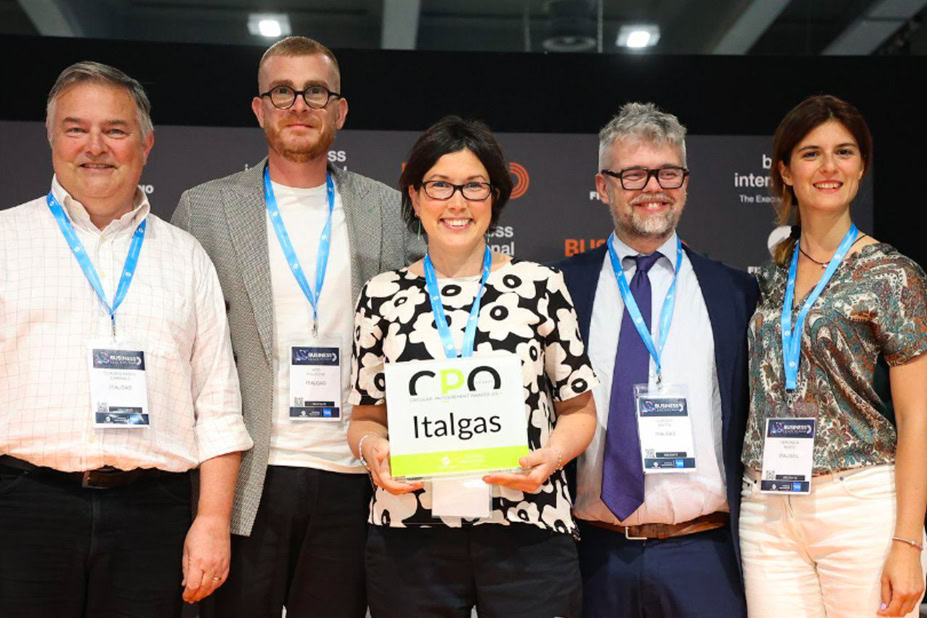
Circular Economy
Our mission is to reduce environmental impact and solidify the company’s position as a leader in sustainable energy infrastructure.
What is the Circular Economy?
The circular economy is an economic model that, unlike the traditional linear “take-make-dispose” approach, focuses on minimizing waste and environmental impact by extending the lifecycle of products through reuse, recycling, and material regeneration. This model is critical in addressing resource scarcity, reducing CO₂ emissions, and fostering sustainable development, benefiting the environment, the economy, and society as a whole.
Italgas, committed to driving the energy transition, champions the circular economy through projects such as network digitalization, material recovery in infrastructure, and the development of biogas and hydrogen, contributing to a more sustainable and resilient energy ecosystem.
Italgas’ Goals and Achievements
The circular economy model seeks to minimize resource consumption by prioritizing material reuse and recycling wherever possible. Key milestones achieved in 2023 include:
- The installation of 2.5 km of bio-sourced PE100-RC pipelines, significantly reducing CO₂ emissions.
- The use of recycled backfill materials during pipeline installation, which resulted in approximately 45% cost savings compared to traditional materials.
![]()

Circular Procurement Awards 2024
Italgas received recognition in the "Protecting the Environment - Recycle and Reuse" category for its innovative use of bio-polyethylene pipes, reinforcing its role as the first utility in Italy to incorporate bio-based materials in the gas sector.
Collaboration with Suppliers, Internal Training, and Green Solutions
Italgas is committed to collaborating with existing and new suppliers to identify eco-friendly solutions and explore innovative materials. In this effort, the company has partnered with Politecnico di Torino and other universities, while also enhancing internal training through the IG Academy. Dedicated sessions aim to raise awareness and educate employees on sustainable practices and efficient material management.

Politecnico di Torino: The Challenge
Italgas, in collaboration with the Politecnico di Torino incubator I3P, launched the "Cantiere del Futuro" (Construction Site of the Future) challenge, supported by Ideas4Italgas. The initiative seeks innovative and sustainable solutions for construction sites and has attracted significant interest from startups and SMEs worldwide.
The Benefits of the Circular Economy
The circular economy is a forward-thinking model that combines economic competitiveness, environmental protection, and social benefits, contributing to long-term sustainable development.
-
Economici
Risparmio: ottimizzazione dell'uso delle risorse, riduzione dei costi associati all'acquisto di materie prime e allo smaltimento dei rifiuti. Innovazione: promuove nuovi modelli di business come il "pay-per-use", il noleggio o il riciclo avanzato, aprendo nuove opportunità di mercato e generando nuove fonti di reddito.
-
Ambientali
Meno rifiuti: prolungando il ciclo di vita dei prodotti, diminuisce la quantità di rifiuti destinati alle discariche o all'incenerimento. Minore sfruttamento delle risorse naturali: riutilizzo e riciclo riducono il consumo di energia, di acqua e l'estrazione di risorse vergini proteggendo gli ecosistemi e la biodiversità.
-
Sociali
Migliore qualità della vita: i prodotti durevoli, riparabili e accessibili contribuiscono a una maggiore equità e sostenibilità per la popolazione. Inclusione: i progetti legati all'economia circolare possono coinvolgere gruppi svantaggiati in attività di riciclo, riparazione e riuso, favorendo l'integrazione.
Smart Construction Sites
Through its Smart Construction Sites project, Italgas has been nominated for the Pimpy Green Award 2024. This project reduces the environmental impact of construction activities while supporting the sustainability objectives outlined in the Group’s Strategic Plan and Sustainable Value Creation Plan.
Key initiatives include:
- The adoption of Renovation VRC Bio-Sourced pipelines, made from non-fossil raw materials that offer enhanced resistance to cracking (Raised Crack) and allow for the use of recycled backfill materials.
The integration of the WorkOnSite digital system, developed by the company’s internal Digital Factory, to manage site inspections remotely. This innovation reduces the need for physical site visits, significantly lowering CO₂ emissions.
![]()